Intrigued, I went online to find more information. Not surprisingly, there was none to be found: the English-language Russia press is never up-to-the-minute, and the state-tamed Russian language press said nothing of the planned actions. Among the few sites I checked, only Ekho Moskvy's website carried the story, noting that the United Civil Front and the National Bolsheviks would hold a rally at Pushkin Square. They had originally planned to march down Tverskaya Ulitsa to finish their rally at Manezh Square, but such action was banned by the Moscow Mayor's office. The announcement also noted that the KPRF (Communist Party of the Russian Federation) would be holding a rally on Teatralnaya Square in front of the Karl Marx statue at 1:00. This, of course, highlights the fact that media coverage and PR remains a major obstacle to these grassroots political movements. What about the hundreds of thousands of citizens that weren't listening to Ekho Moskvy? Until these groups can somehow reach an audience bigger than their own base, I'm afraid they'll never really amount to much.
At first I was torn about what to do. Part of me was dying to see the few beleaguered forces of Russia's civil society in action. As I've written elsewhere, political plurality has become so restricted in Russia that eventually the streets will be the only place meaningful political action will be able to exist. And so, I had a deep desire to see it for myself.
But at the same time, part of me was afraid. I read what happened in St. Petersburg and Nizhny Novgorod, and getting arrested in Russia was not high on my list of "fun things to do in Moscow," especially not three days before I'm due to visit the U.S. Perhaps more importantly, having an arrest record in Russia would likely complicate or even prevent my future attempts to obtain a Russian visa, something I'm not willing to risk.
Eventually curiosity won out (I knew it would in the end), and I headed to Pushkin Square to see what was going on. But still, I was nervous, so I decided to stay outside the main demonstration area, entrance to which was controlled by metal detectors and plenty of police and OMON forces. In the very least, I figured I could slip out easier if things got out of hand.
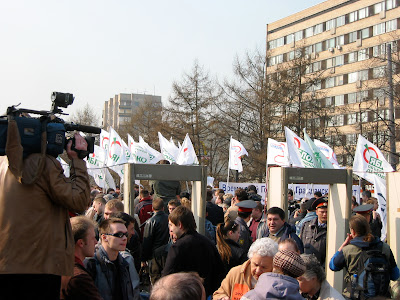
Having just arrived, I was startled to find myself face to face with the grand master himself, Garry Kasparov, who was giving interviews to a Reuters reporter:
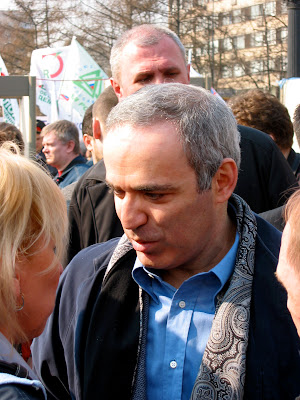
At one point an ordinary babushka muscled her way up to Kasparov (seriously folks, don't mess with the babushkas), and accused him of not having been a "Soviet person" (советский человек) I'm not really sure what exactly that criticism meant. His response: "I was born in the same Soviet Union as you. I was the Soviet champion. How was I not a 'Soviet person?'":
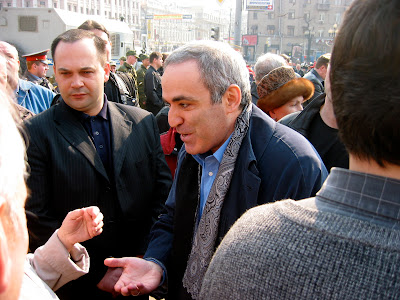
As he headed off toward the metal detectors, I called out to him and asked for an autograph, which he willingly gave. Now I guess I have another reason to back this guy as a presidential candidate!
Likely due to the combination of a small base to begin with and difficulties in reaching a broader general audience, the gathering was surprisingly small:

It was also interesting that the National Bolsheviks were not present, despite the fact that their participation in the event had been reported on the radio. They were recently banned from protesting in Moscow, deemed an extremist group, but I hardly think that would have stopped them from coming out. Perhaps it was a tactical decision made by the event's organizers, realizing that presence of the National Bolsheviks would have threatened a ban on the entire rally. This is just a guess, and if anyone has any better information, I'm anxious to hear it.
Unfortunately, my position outside the main protest area prevented me from hearing the speeches. Of course, it didn't help that the speakers had at their disposal only a battery-operated bullhorn. Needless to say, it was an interesting crowd. In addition to Kasparov's United Civil Front flags, there were lots of Yabloko flags, along with flags for an organization I'm not familiar with (SKS - Union of Coordinated Councils, or something like that). There were a couple of communists, plus many people wearing orange "ribbons" stating, "This is our city." In general, it seemed like all age groups were represented.


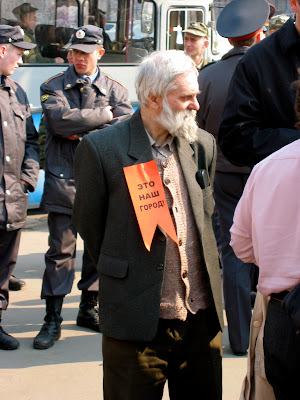
And of course, there was plenty of security:
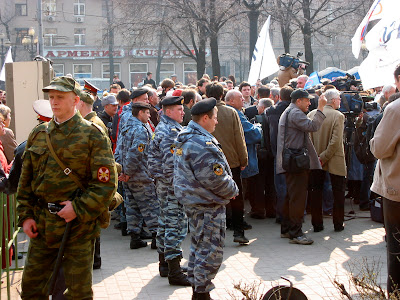
Around 12:45, things at Pushkin Square seemed to wrap up, and people started shuffling out of the fenced-in protest area. All in all, it appeared quite orderly, and I only observed one scuffle between a protester and police (sorry, not a very exciting picture, but this was as close as I could get):
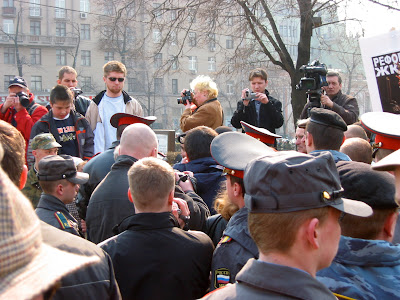
I'm sure the riot police must have been disappointed. Unlike their comrades in St. Petersburg, they didn't get the opportunity to crack a few skulls for fun. But still they seemed to be enjoying the lovely weather, don't you think?
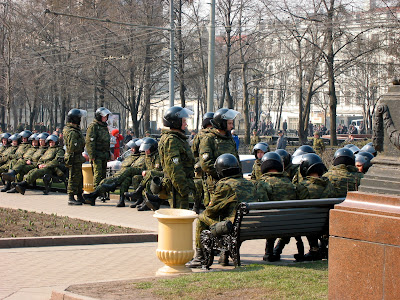
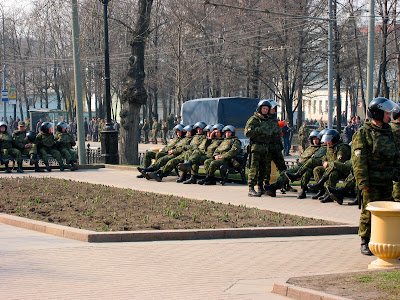
The protesters still intended to march down Tverskaya but stayed on the sidewalks, thereby avoiding a violation of Luzhkov's ban. Interestingly, they all rolled up and put away their flags and banners before heading toward the center of town, likely a similar effort to avoid being found in violation of the ban. Without flags and banners, they're just people walking down the sidewalk. Of course, these "people out for a stroll" were followed the whole way down by police and OMON forces. And by me, of course...
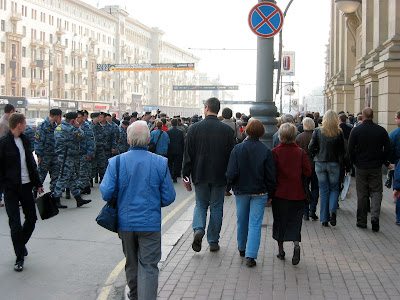
When the group reached the end of Tverskaya, it turned left onto Okhotniy Ryad, which had been closed to traffic. Somewhat startling to see one of Moscow's busiest thoroughfare's completely void of cars:

As we approached Teatralnaya Square where the Communist rally was about to begin, I could hear the chant, "This is our city!" coming from the square up ahead. The rag-tag group at Pushkin Square had tried to get this chant going earlier, but it was predictably weak. What I heard up ahead of me, however, gave away the much larger demonstration the Communists had put together.
At this point, the protesters from Pushkinskaya passed through the new set of metal detectors to join the Communists in opposition. I had a decision to make: would I go through with them, or play it safe and stay outside? There's an old saying that if you're in the water with sharks, you don't have to outswim the shark, you just have to outswim the guy next to you. Similarly, when attending a political protest, you don't have to outrun the cops, you just have to outrun the other guy. Looking over the gathering of red flag-wielding babushkas and dedushkas in the square, I figured I had a good chance of surving this one. I entered.
What the chants had told my ears was confirmed by what I saw with my eyes: there were many times more communist protesters than there had been liberal protesters at Pushkin. Just another sign of the uphill battle facing Russian liberals:
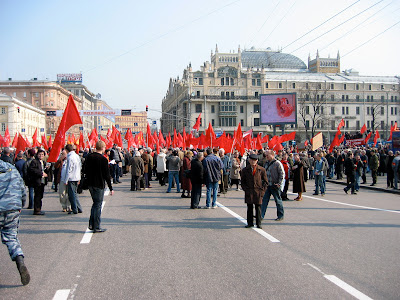
Of course, the usual sea of red banners and flags was present, along with the occasional picture of Josef Vissarionovich:


One of the things that surprised me was the noticable presence of youth communist supporters. Of course, they were greatly outnumbered by elderly people, but there were more than just a few showing their support for communism:
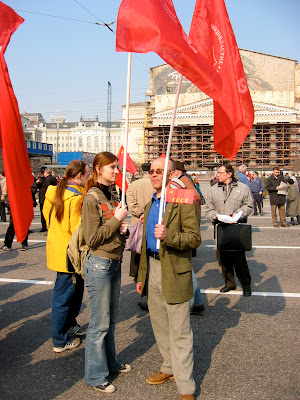
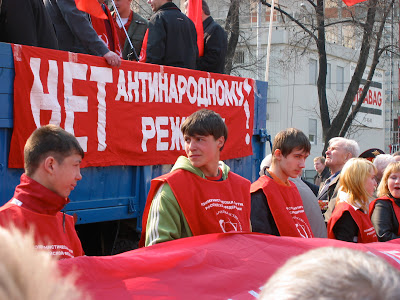
The speakers addressed the crowd from atop a large truck. Unlike the liberals, they had a good sound system that blasted their impassioned demands across the square. Several speakers took the podium, demanding everything from higher pensions to better schools to preservation of a historic stadium and other Moscow properties.
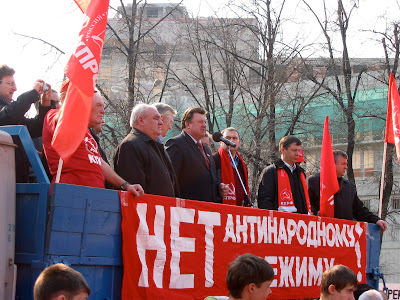
What I found interesting is that most of the speeches were focused on specific issues, many of which were local to Moscow. The speakers were not, in most cases, calling for major systemic changes to the Russian polity, an important point to keep in mind when analyzing the current trajectory of the Russian opposition protest movement. While the banner hanging from the truck read, "NO to the Anti-people Regime!," in fact their verbal statements weren't so revolutionary.
Here's a few additional photos from the rally...
Classic:
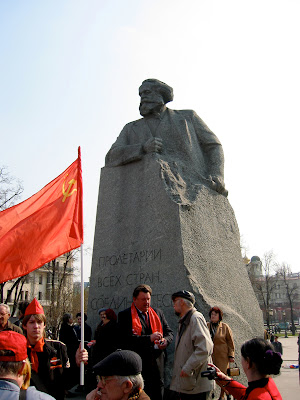
Crowd shot:
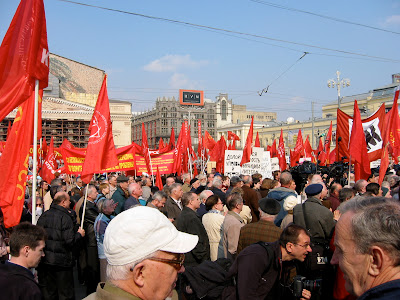
This is why you don't get into arguments with Communist babushkas. This babushka was in the younger woman's face for a good 3 minutes, a confrontation ignited when the latter claimed that Putin had done good things for Russia. "Name one good thing he's done for Russia!" exclaimed our frail but feisty friend:
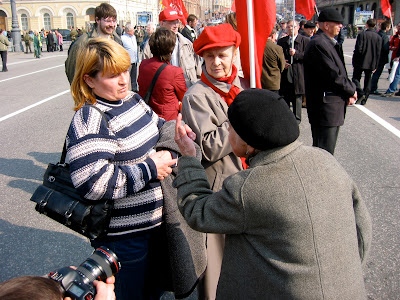
Of course, there's the old exhortation, "pick on somebody your own size," which babushkas follow as well, getting into heated debates with other babushkas:

This banner was prominently placed at the front of the crowd. I'm guessing it's some sort of reference to the Kalashnikov series of rifles (the most famous of which is the AK-47). Not sure what the reference is, so if anybody is familiar with the logo, let me know.
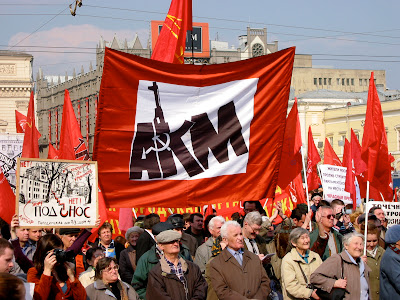
Finally, here was an interesting sign that caught my eye. It's a drawing of Mayor Luzhkov attempting to dismantle the famous "Worker and Kolkhoznitsa" statue (Luzhkov has a penchant for tearing down anything that could be made into a parking lot or shopping mall). The text reads, "Moscow's Best Estonian," clearly a reference to Estonia's decision to dismantle the Soviet-era monument to the "Liberator Soldier" in Tallinn.
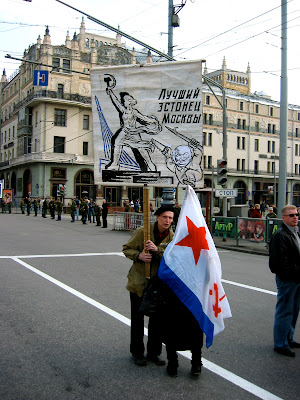
After a couple of hours the rally ended without incident, the protesters carefully folded their red flags and rolled up their banners, and cleared the square in an orderly fashion.
Fortunately, neither they nor I were arrested...
My entire photo album (about 55 photos) from the day's events can be found here.









